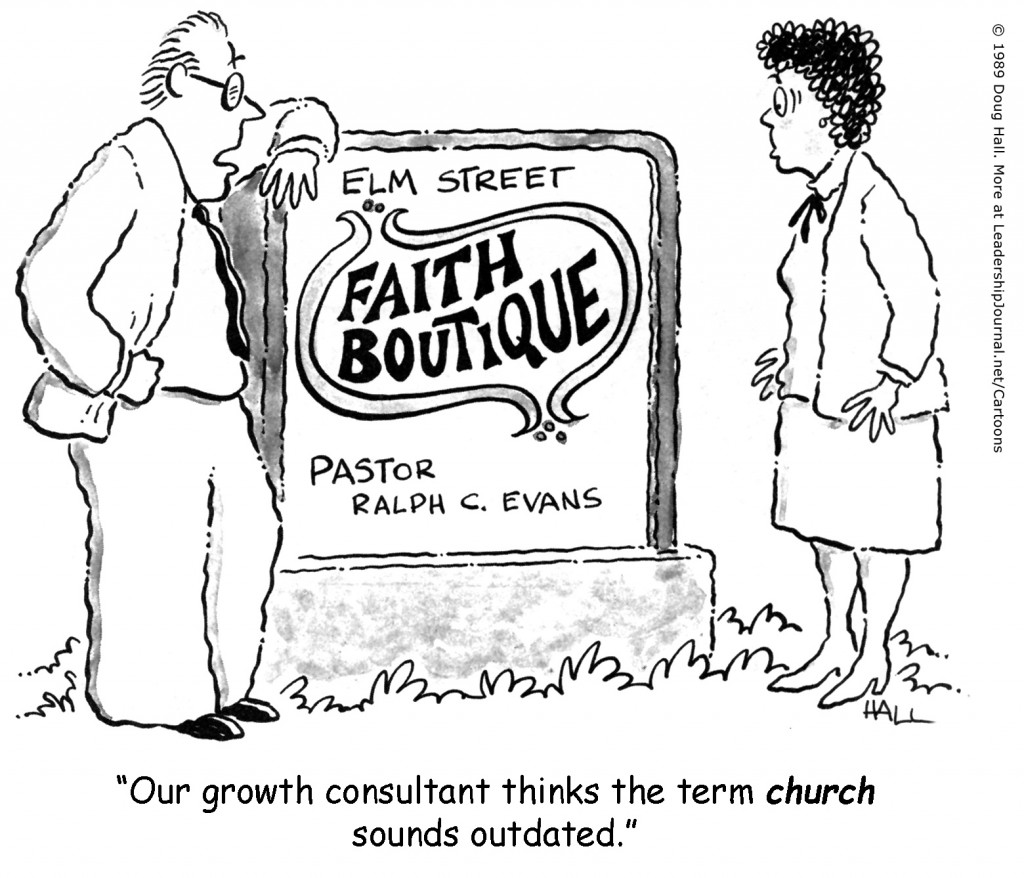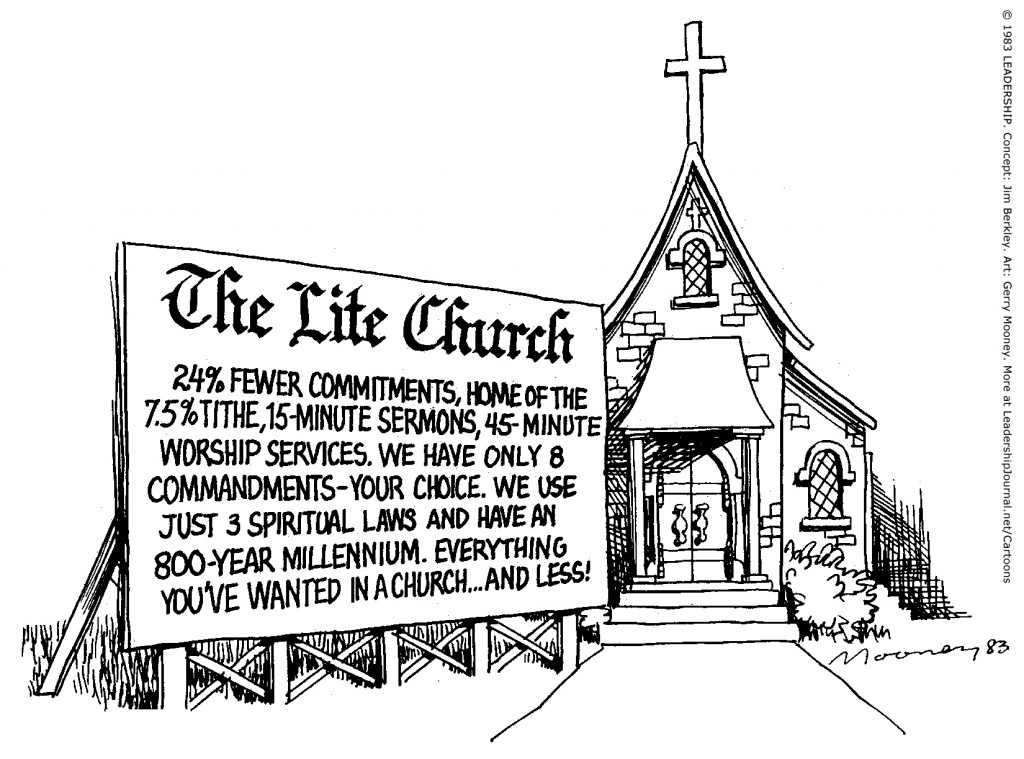Dear Brothers and Sisters,
 In one of his earliest movies, John Wayne tells another cowboy, “I don’t like branding—it hurts in the wrong place!” That comment made me chuckle, though it also got me thinking about how churches can hurt the gospel through an inappropriate use of marketing techniques like product branding. It happened in our history—seeking a marketing “hook,” our founder branded us the one true church. This approach compromised biblical truth as the gospel was redefined in order to promote the brand.
In one of his earliest movies, John Wayne tells another cowboy, “I don’t like branding—it hurts in the wrong place!” That comment made me chuckle, though it also got me thinking about how churches can hurt the gospel through an inappropriate use of marketing techniques like product branding. It happened in our history—seeking a marketing “hook,” our founder branded us the one true church. This approach compromised biblical truth as the gospel was redefined in order to promote the brand.
Sharing with Jesus in advancing his gospel
Our calling as Christians is not to market a brand, but to join Jesus in what he is doing by the Spirit, through the church, to advance his gospel in the world. Jesus’ gospel addresses several things: how forgiveness and reconciliation have been accomplished by Jesus’ atonement; how the Spirit transforms us (and what the transformed life looks like); the nature of our vocation as followers of Jesus sent on mission with him into the world; and the ultimate hope we have of sharing forever in the communion that Jesus has with the Father and the Spirit.

(used with artist’s permission)
There are some (though limited) ways in which marketing (including branding) can help us accomplish the gospel work to which Jesus has called us. For example, we can productively use logos, websites, social media, bulletins, newsletters, signs, mailers and other communication tools to help us spread Jesus’ message, inviting people to respond in faith. But such tools must serve, not diminish our calling to be light and salt in our communities. So I’m not against marketing, rightly used, but I do want to offer a word of caution, along with some perspective.
A word of caution

According to George Barna (in A Step by Step Guide to Church Marketing), marketing is “a broad term that encompasses all the activities that lead up to an exchange of equally valued goods between consenting parties.” Barna further defines marketing by saying that activities such as advertising, public relations, strategic planning, audience research, product distributions, fund raising, product pricing, developing a vision statement and customer service are all elements of marketing. He then says: “When these elements are combined in a transaction in which the parties involved exchange items of equivalent worth, the marketing act has been consummated.” Let that idea of exchanging items of equivalent worth sink in for a moment.
Several years ago, several of our pastors read a book by the pastor of a Southern California mega-church. It promised, in essence, that if you will market your church in a particular manner, you cannot fail because everyone will be excited about what you are offering them and their community. Some of our pastors tried the recommended marketing techniques, but became discouraged when their congregations did not grow.

But should we be marketing the gospel (and our churches) the way Walmart markets t-shirts, or Sears markets tools—or even the way particular denominations and congregations use marketing to bring about numerical growth? I think we all would agree that we must not “peddle” the gospel as though it was a consumer good to be exchanged for something of seemingly equivalent value. That sort of marketing is not what Jesus had in mind in commissioning us to take his gospel to the world in order to make disciples of all people-groups.
As the apostle Paul noted, rather than being seen as attractive (like a desired consumer product), the gospel often is viewed as repulsive or foolish by those who, living according to the flesh, have a decidedly secular mindset (see 1 Corinthians 1:18-23). As those who follow Jesus, “We do not set our minds on what the flesh wants, but…on what the Spirit desires” (Romans 8:4-5). We’re certainly not perfect in that, but as we walk in step with the Spirit, our minds and actions are conformed to God’s will (and thus his work). Given these understandings, it’s no surprise Paul repudiated certain “fleshly” (secular) techniques for advancing the work of the gospel:
Having this ministry by the mercy of God, we do not lose heart. But we have renounced disgraceful, underhanded ways. We refuse to practice cunning or to tamper with God’s word, but by the open statement of the truth we would commend ourselves to everyone’s conscience in the sight of God. (2 Corinthians 4:1-2 ESV)
Paul refused to use techniques that, though they might advance his ministry in the short-term, would ultimately compromise the message of the gospel. The only kind of “success” he wanted in life and ministry was that which comes from faithfulness to Christ and his gospel.
Some of the gospel-compromising, marketing-driven approaches being used by some churches in our day go like this: “Come to our church and your problems will be solved, you will achieve health and wealth, you will be richly blessed.” The blessings being promised typically have to do with power, success, and getting what you want. The bait-and-switch occurs when those who come are told about the conditions they must meet to get the blessings—things like having a certain level of faith, or joining a small group, tithing one’s income, actively serving in a ministry of the church, or spending a specific amount of time in prayer and Bible study. While some of these are helpful for growing as followers of Jesus, none are ways to get God to be favorable towards us—to obtain what we want in exchange for something God wants or needs from us.
False advertising and deceptive marketing
Attracting people to a church or a ministry by telling them how they can contract with God to get whatever they want is false advertising and deceptive marketing. It is nothing but paganism in a modern wrapper. Christ did not die to meet our selfish consumer needs. He did not come to guarantee us health and wealth. Instead, he came to bring us into a gracious relationship with the Father, Son and Spirit and the peace, joy and hope that is the fruit of that relationship. In and through that relationship, we are empowered to love and serve others with God’s kind of costly, transforming love. That kind of love will, at times, be offensive to some (perhaps many), but it will always direct others to the very Source of that saving, redeeming and transforming love.
Should we market the gospel as an exchange of equally valued items between consenting parties? Certainly not! The gospel is, by grace, freely given to all. And all we can do is receive this gift with empty, up-turned hands—thankfully receiving the blessing of belonging to God. That relationship of grace and love is lived out in a life of grateful worship—a response that, itself, is enabled by the Holy Spirit, who opens our eyes and sets aside our pride and rebellious demand for independence from God to live for his glory.
A glorious exchange
With those thoughts in mind, I do want to point out that in the life we have in and with Christ, through the Spirit, there is an exchange of sorts, indeed a glorious exchange. Note Paul’s comment:
I am crucified with Christ: nevertheless I live; yet not I, but Christ liveth in me: and the life which I now live in the flesh I live by the faith of the Son of God, who loved me, and gave himself for me. (Galatians 2:20 KJV)
We give Jesus our life of sin and he gives us his life of righteousness. When we give away our lives, we find his life at work in us. When we surrender our lives to Christ we find real purpose for our lives so that we no longer live for ourselves but to advance the reputation of God our Creator and Redeemer. That exchange is not a marketing technique—it’s grace. We get the whole God, Father, Son and Spirit, and he gets all of us: body and soul. We get the righteous character of Christ, and he takes away our sins, totally forgiving us. This is certainly not an exchange of equally valued goods!
If anyone believes in Christ, he or she is a new creation—a child of God. The Holy Spirit gives us this new life—the life of God living in us. And as that new creation, the Spirit gracefully transforms us to share more and more in Christ’s perfect love for God and for others. When our lives are placed in Christ, then we share in his life, in both his joy and in his long-suffering love. We share in his sufferings, in his death, in his righteousness, as well as in his resurrection, ascension and eventual glorification. As God’s children we are co-heirs with Christ who share in his perfect relationship with the Father. In that relationship we benefit from all that Christ has done for us to become God’s beloved children, united with him—forever in glory!
Celebrating the glorious exchange,
Joseph Tkach



Thanks, Joe for your words – our experience agrees with what you say and we have found the best way to “market” or “brand” our fellowship/preaching the good news of the gospel is showing the people in our community the authentic love of God that we have to share because we know we are loved. This Chinese poem sums it up really well:
Go to the people
Live among them.
Learn from them.
Love them.
Start with what they know.
Build on what they have.
For more about the “glorious exchange” referred to in Dr. Tkach’s letter this week see the article “The Christian Life and Our Participation in Christ’s Continuing Ministry”by Dr. Gary Deddo at https://www.gci.org/christian-life
Thank you. This is inspiring and worth keeping on file,to occasionally refer to, for those still struggling with the issues of God’s grace.
Thanks for this! I needed it.
In North America the free market is sacrosanct. But pure capitalism is mythical when we understand the way in which markets are controlled by special interests.
An area where the free market operates and should not is in the formulation of theology. This happens principally within the Christian publishing industry. Christian authors are trying to make money. To do this they must write what that the market will purchase. This shapes and forms the theology they write about and how it is presented. (I think of the embarrassing but energetically marketed “Prayer of Jabez” industry.) But the free market defines even the academic presentation of theology. Supply and demand rules. The American theological output is derived from competition in the marketplace of ideas. Not always but far too much.
As Christ said, “It is like unto children sitting in the markets, and calling unto their fellows, and saying, We have piped unto you, and ye have not danced; we have mourned unto you, and ye have not lamented.” We have a demand that you need to supply.
Thank you very much Brother,
No matter how closer we try to look at the gospel to have it clearer we absolutely need the magnifying glass:JESUS THE INCARNATED WORD OF GOD.
A Special thank you for this article.
Joseph